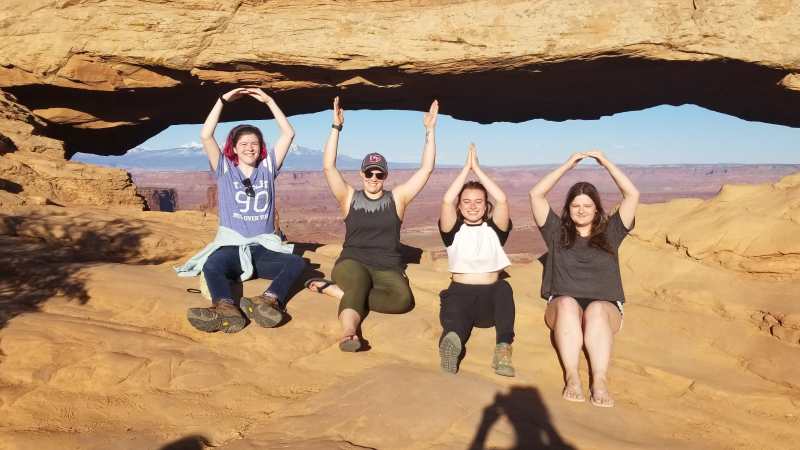
Bachelor of Science in Earth Science: Geological Sciences Subprogram
The Geological Sciences BS subprogram revolves around the study of Earth’s composition, structure, and natural processes, and how these have changed over Earth’s 4.56 billion-year history. Geoscientists work to understand our planet’s history and current processes using a broad swath of natural and physical sciences. Because their work occurs at the intersection of the biosphere, geosphere, atmosphere, and hydrosphere, geoscientists are uniquely positioned to help society and the environment.
Program Requirements
The Geological Sciences Subprogram requires 24 credit hours of courses in addition to the 7-10 credit hours of core courses required for all Earth Science BS students. Like all Earth Science BS Subprograms, Geological Sciences requires the completion of an approved certificate, minor, or any second major. The Geological Sciences Subprogram has a 50% overlap with the School of Earth Sciences' Petroleum Geology and Natural History Museum Curation Certificates, meaning that it is possible to earn one of these certificates with as little as 2 additional courses.
Sample 4-year curriculum
Preparation for the Major (28-29 units)
Sustainability Course Requirement (4 units)
- The sustainability course requirement is fulfilled by EARTHSC 2122, required by this subprogram.
Required for everyone in the Geological Sciences Subprogram (24 units)
- EARTHSC 2122: Climate and Life over Billions of Years on Earth (4 units, au,sp)
- EARTHSC 4421: Earth Materials (3 units, au)
- EARTHSC 4423: Introductory Petrology (3 units, sp)
- EARTHSC 4502: Stratigraphy and Sedimentology (4 units, sp)
- EARTHSC 4530: Structural Geology (4 units, au)
- EARTHSC 5189.01: Field Geology 1 (3 units, su session 1)
- EARTHSC 5189.02: Field Geology 2 (3 units, su session 2)
EARTHSC 5189.01 & 5189.01 comprise the 6-week Summer Field Camp program, held in Utah.
Required for all Earth Sciences BS (7-10 units)
- EARTHSC 2000: Preparation for Thesis and Careers in Earth Sciences (1 unit, au)
- EARTHSC 2245: Introductory Data Analysis for Earth and Environmental Sciences (4 units, sp)
- EARTHSC 4999.01: Undergraduate Research for Thesis in Earth Sciences (1 unit, graded)
- EARTHSC 4999.02 (H): Undergraduate Research for Thesis in Earth Sciences (1-3 units, satisfactory/unsatisfactory)
Honors program students
- Enroll in 1 unit in 4999.01H in the semester you plan to graduate.
Non-honors program students
- You need to enroll in 1 unit of 4999.01 in the semester you plan to graduate.
- You need to enroll in at least 3 unit of 4999.02H anytime during your degree, which includes the semester you plan to graduate.
Applying for research distinction
If you choose to apply for research distinction (optional), you also need to enroll in at least 3 units of 4999.02 anytime during your degree, which includes the semester you plan to graduate. Applications to apply for research distinction are due early in your penultimate semester. More information is available at the ASC advising website.
Advising information
Director of Undergraduate Studies (Earth Sciences): Professor Ann Cook, cook.1129@osu.edu
Undergraduate Academic Advisor (Earth Sciences): Dr. Karen Royce, royce.6@osu.edu, 614-292-6961
The state of Ohio does not license Geologists; however, if you plan to pursue licensure or certification in a state other than Ohio, please review state educational requirements for licensure and certification and state licensing board contact information at the Office of Distance Education and eLearning- State Authorizations for Students.
